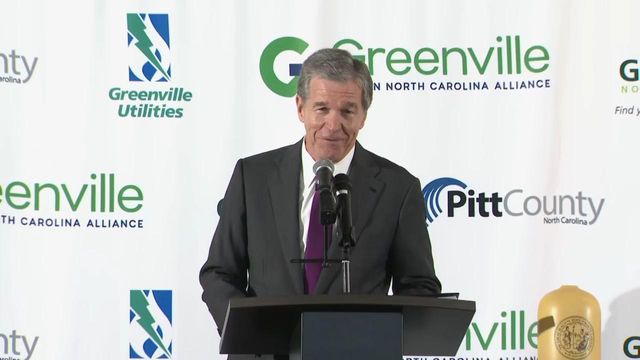Nonprofit provides TV studio for Lt. Gov. Forest's office

A little-known group set up by the Lieutenant Governor's Office and headed by a major campaign donor has provided Lt. Gov. Dan Forest with enough television equipment to build an in-office studio.
Forest's arrangement with the North Carolina Promotion and Development Fund appears to be unique in North Carolina state government. Gov. Roy Cooper doesn't have his own television studio, and neither does General Assembly leadership.
NCPDF is a 501(c)(4), also known by its IRS designation as a "social welfare organization." These groups are perhaps best known as political advertising vehicles for anonymous donors, and they're often called "dark money" groups. But attorneys who specialize in this section of the tax code said the category is much broader, and that the way Forest's office uses the NCPDF seems to be allowed under state and federal law, without disclosing donors, provided the group doesn't fund campaign activities.
Neither "the studio nor any of the items purchased by the NCPDF have been or ever will be used for campaign purposes," Forest Chief of Staff Hal Weatherman said.
Weatherman also said the NCPDF doesn't engage in political spending. But it could under IRS rules. Such social welfare groups are required to "further the common good and general welfare of the people of the community" and can fund certain political activities and advertising so long as that isn't their primary activity.
The group was created in 2013 to avoid asking taxpayers for new office funding, Weatherman said. A breakdown he provided values the TV equipment at about $61,000. Critics question the "social welfare" purpose a television studio serves in Forest's office and whether the group is investing in the state, or in Forest himself ahead of an expected 2020 run for governor.
"Seems to be, clearly, to inflate his visibility for some larger purpose," said Bob Hall, executive director of Democracy North Carolina, a left-leaning advocacy group. "It doesn't sound like it's – it's not part of the duties of the lieutenant governor."
Charlotte booster behind group
The Lieutenant Governor's Office said NCPDF is run and at least partly funded by David Longo, a Charlotte-area businessman and a Forest supporter.
If there are other donors, they are not publicly known. Tax documents indicate that, in recent years, the group raised less than $50,000 annually.
Longo was the NCPDF's registered agent when the group was created, according to the articles of incorporation that represent one of the few public traces of the fund's existence. He and Robert Lyerly, a Raleigh tax attorney, are the only two people listed on the group's articles of incorporation. Neither returned repeated phone calls and emails seeking comment.
Longo has been one of Forest's most generous political supporters. He and his wife both gave $11,000 to the lieutenant governor's re-election campaign during the last cycle, then the maximum allowed by law.
He was the treasurer last year for Truth & Prosperity, a political action committee that supported Forest's re-election, and Longo gave that group $50,000. In 2012, he gave $75,000 to Citizens for Accountability, another pro-Forest committee. He and members of his family donated $40,000 directly to Forest's campaign.
Longo's company, Carolina Business Interiors, also was the lead donor on a 2013 remake of the Hawkins-Hartness House, the downtown Raleigh mansion that houses the Lieutenant Governor's Office. That project drew donations from more than half a dozen companies, and renovations at the house were estimated at $600,000, refurbishing a 137-year-old landmark at little cost to taxpayers.
Carolina Business Interiors has since provided more furniture to the office as part of a sprucing up this year that was valued at more than $72,600, according to documents Weatherman provided to WRAL News. Weatherman said those items, and equipment for the television studio, will be reported to the state Department of Administration, which oversees state office buildings and purchasing contracts.
The Lieutenant Governor's Office has described the furniture, fixtures and other items provided by Carolina Business Interiors as a mixture of donations and loans. Donated items, including a rebuilt stairwell, blinds and light fixtures, stay with the state. For loaned items Weatherman said it's up to the donor what happens to them once Forest leaves the Lieutenant Governor's Office.
"I think it's a safe assumption probably that, when there's a Democratic lieutenant governor, that studio gets yanked out," said state Rep. Grier Martin, D-Wake, who is recruiting candidates and raising money for next year's state House races. "Then it looks a lot less like a loan to the people of North Carolina."
The television equipment is owned by NCPDF and was installed in an otherwise unused room at the Hawkins-Hartness House, Forest's office has said. The furniture did not flow through NCPDF, but came from Longo's company.
'No tools to communicate'
It's unclear who came up with the idea for a TV studio for the Lieutenant Governor's Office.
Weatherman said it is the smallest agency in state government, and that, out of its roughly $794,000 annual budget, only about $50,000 is available for operations once salaries and benefits are paid.
"We had no tools to communicate with our constituents and no way to pay for adding them," Weatherman said in an email.
Forest has an official website, a Facebook page, a Twitter account, an Instagram page and a YouTube channel. The YouTube channel includes videos explaining various aspects of state government and often criticizing the media for failing to cover issues accurately. Forest also does sit-down interviews with Republican legislators.
The studio can provide a high-quality feed for television interviews, his office said. Forest in the past has appeared on national news programs to discuss issues such as the since-repealed House Bill 2.
Cooper's office also sends out videos on social media, typically produced by a member of his press office using a digital SLR camera that "was a holdover from the previous administration," spokesman Ford Porter said. The Governors Office occasionally uses a camera and cameraman from the North Carolina Museum of Natural Sciences, Porter said, a service that's also available to other state agencies, including the lieutenant governor's office.
For major events, including emergency broadcasts, UNC-TV sends out a feed, but television interview requests generally require a trip to a local network studio, Porter said.
The television equipment for the Lieutenant Governor's Office came in two waves, according to Weatherman: One a couple of years ago when the studio was set up, and the rest earlier this year when it was upgraded. If terms of its use by the Lieutenant Governor's Office are written down, the office did not provide them.
WRAL News began questioning the studio and its funding after Forest's office reached out in October to test studio upgrades. After a number of questions and emails back-and-forth, his office rebuffed a station request to take pictures of the equipment. A rundown of equipment Weatherman provided lists a $14,165 camera along with professional lighting, editing equipment, a teleprompter and $2,200 worth of soundproofing.
Weatherman declined to document other NCPDF spending other than to say the group pays for catering and other event costs at Hawkins-Hartness, including at least one Christmas open house. These costs are "associated with official representational duties of the office of Lt. Governor," Weatherman said in an email.
The lieutenant governor's official duties are limited. He presides over the state Senate, technically becomes acting governor when the governor travels out of state and serves on a number of state boards, including the State Board of Education.
Different than Commerce, mansion funds
Weatherman said he believes the NCPDF arrangement is unique among state elected officials, but that it was modeled after the state Department of Commerce's "Friends of North Carolina."
Friends of North Carolina was part of the now defunct N.C. Commerce Trade and Development Fund, a 501(c)(6) organization – similar to a local chamber of commerce – that raised money from businesses and economic development agencies around the state to recruit new businesses to North Carolina. That group's IRS 990 tax forms don't lay out its funding sources, but Department of Commerce spokesman David Rhoades said that, based on his experience, "whenever questions arose, the group responded."
There are other groups designed to bolster government functions with private donations. The Executive Mansion Fund raises money to keep up public areas of the governor's mansion, but that group is a 501(c)(3), a designation that limits a group's ability to engage on political issues. Donations are also tax deductible, which is generally not the case for 501(c)(4)s.
The mansion fund lists on its tax forms donations of $5,000 or more, though those donations are sometimes simply marked anonymous. The group spent $13,312 last year on mansion projects. Among its larger expenses in recent years: $39,300 for former Gov. Pat McCrory's official portrait.
The group was founded in 1988 and operates regardless of who the governor is, according to Jim Huebler, a state official who works with a number of these private fundraising groups.
"That's the difference there," said Hall, the Democracy N.C. executive director. "They're multi-partisan. They're not serving a shadow partisan function."
Tyler Dukes contributed to this report.









